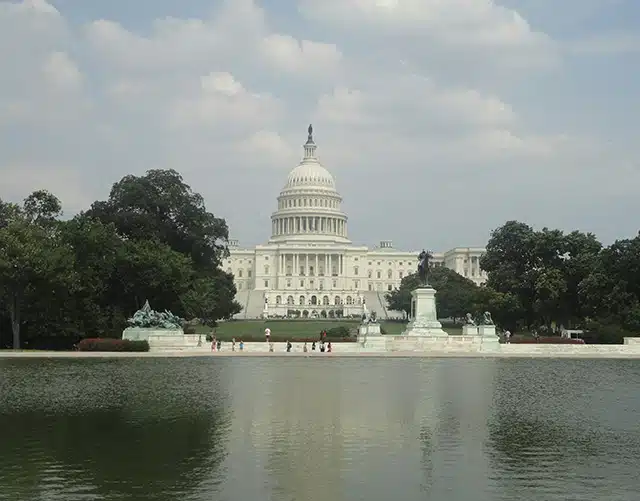Editor’s Note: This is the second of two articles in the series “The One Big Beautiful Bill Act:
A Complete Guide to What Changed and What It Means for Your Clients.” Capizzi is executive vice president with Dunham & Associates Investment Counsel Inc., which previously published the series. Part 1 explains changes that may affect your individuals clients. Part 2 below explains changes that may affect your business-owner and estate clients. His goal is that you can use these articles as a resource when questions arise. Other Rethinking65 articles have featured Sal. At the end of this article, see an overview of the new law, signed by President Trump on July 4.

The One Big Beautiful Bill Act (OBBBA) lives up to its name in scope and impact. While “beautiful” might be subjective, there’s no denying this legislation will significantly affect how Americans pay taxes for years. The key is understanding how these changes apply to your client’s situation and taking action to maximize the benefits.
Changes for Estate Taxes and Trusts
The OBBBA significantly impacts estates and trusts by modifying the federal estate, gift, and generation-skipping transfer (GST) tax exemption.
• The OBBBA permanently increases the federal estate, gift, and GST tax exemption to $15 million per individual or $30 million for married couples. This is effective after December 31, 2025, and is a substantial increase from the previous inflation-adjusted amount.
• This increase is important because individuals who have used their lifetime gift tax exclusion may have an additional $1,110,000 exclusion available for gifting in 2026.
Overall, the OBBBA permanently increases exemption amounts, creating a more favorable environment for estate and trust planning, particularly for higher-net-worth individuals.
Business Owners’ Tax Changes
Here are the changes OBBBA offers your business owner clients.
Qualified Small Business Stock (QSBS) Gets Better
Section 1202, which, before July 5, 2025, allowed your C-Corp business owners to possibly exclude up to $10 million in gains from selling qualified small business stock, gets three significant expansions under the OBBBA. These changes generally apply to stock issued after July 4, 2025.
Tiered Gain Exclusion
Instead of a flat five-year holding period for 100% gain exclusion, the OBBBA introduces a tiered system for stock acquired after July 4, 2025.
• 50% exclusion for QSBS held for at least three years.
• 75% exclusion for QSBS held for at least four years.
• 100% exclusion for QSBS held for at least five years.
Increased Annual Exclusion Cap
The per-issuer cap on excludable QSBS gain is raised from $10 million to $15 million and is indexed for inflation starting in 2027.
Higher Company Asset Threshold
The gross assets test for a company to qualify as a small business increases from $50 million to $75 million and is inflation-indexed for 2027.
These changes significantly increase the concept of stacking 1202, Call us for more details to magnify these changes potentially.
The 20% Small Business Deduction Is Permanent
The Section 199A deduction, which allows most small business owners to deduct 20% of their business income, is now permanent. This applies to:
• Sole proprietorships
• Partnerships
• LLCs
• S-Corporations
100% Bonus Depreciation Returns
Businesses can now immediately deduct the full cost of equipment purchases in the year they buy it, rather than spreading the deduction over several years. This includes:
• Machinery and equipment
• Computers and software
• Vehicles used for business
• Furniture and fixtures
Section 179 Expensing Limit Increases
The annual limit for immediate equipment expensing under Section 179 increases to $2.5 million from $1.16 million in 2024.
Research and Development Gets More Flexible
Businesses can now choose how to handle R&D expenses:
• Deduct them immediately (like before 2022)
• Amortize them over different periods
• Choose the method that works best for their situation
Enhanced Business Interest Deductions
The OBBBA permanently reverts the Adjusted Taxable Income (ATI) calculation to the more favorable EBITDA-based approach, effective for tax years beginning in 2025. This means businesses can again add depreciation and amortization to their ATI when calculating the limitation, potentially increasing their capacity to deduct interest expenses.
The Green Energy Reversal
One of the more significant changes is eliminating most green energy tax credits from the Inflation Reduction Act. This includes:
Immediately Eliminated
• Most renewable energy production credits
• Many solar and wind installation credits
• Electric vehicle purchase credits (significantly restricted)
Phased Out by the End of 2025
• Remaining solar investment tax credits
• Some existing wind production credits
Family and Medical Leave Credits Improved
Employers get better tax credits for providing paid family and medical leave, encouraging more companies to offer these benefits.
Student Loan Payment Exclusion Made Permanent
Employers can continue to pay up to $5,250 annually toward employee student loans tax-free, with annual inflation adjustments starting in 2027.
Child Care Credit Increased
With annual inflation adjustments, the maximum employer-provided child care credit increases to $500,000 and $600,000 for small businesses.
Employee Retention Credit Gets Restricted
The pandemic-era Employee Retention Credit faces new limitations and statute of limitations changes, affecting pending claims and businesses.
Those are the highlights of the changes affecting estates and businesses. Now for a recap of the bill with our quick reference guide.
Quick Overview Reference Guide
Brand New Provisions
• No federal income tax on tips
• No federal income tax on overtime pay
• Baby Savings Accounts for newborns
• Enhanced tax breaks for businesses under QSBS – IRC 1202
• New senior citizen deduction
What is Permanent With No More Expiration Dates
• Lower tax brackets from the 2017 Tax Cut and Job Act (TCJA)
• Higher standard deductions
• Estate and gift tax exemption increased to $15 million per person and indexed for inflation annually.
• 20% small business deduction
• 100% bonus depreciation
• Student loan payment exclusion made permanent
• 60% of AGI for charitable contributions made with cash
• Senior citizen deduction
• Changes under QSBS – IRC 1202
What is Temporary
• SALT cap increase to $40,000 for 2025-2029 tax years for taxpayers earning under $500,000
• Some green energy credit phase-outs
• Automobile-loan interest deduction
• One-time $1,000 federal contribution to Baby Savings Accounts for children born between 2025-2028
• Tax relief on overtime pay for tax years 2025-2028
What is Eliminated
• Most green energy tax credits
• Various international tax benefits
• Some pandemic-era provisions
• The permanent repeal of the personal exemption deduction
Key Numbers to Remember
• 20% – Small business deduction rate
• 100% – Bonus depreciation rate
• $2.5 million – Section 179 expensing limit
• 35% – starting in 2026, the maximum itemized tax break for clients in the top tax bracket
• $15 million – 2026 estate and gift tax exemption
• $5,000 – Baby Savings Account contribution limit
• $6,000 – Senior citizen additional deduction
• 0% – Tax rate on most tips and overtime
• 3 years – Tiered holding period for QSBS
• $15 million – Increased gain exclusion cap for QSBS
• $75 million – QSBS initial corporate asset threshold for company value
Key Dates to Remember
2025
July 4: OBBBA signed into law.
January 19: 100% bonus depreciation begins for property acquired after this date.
December 31: Last day for most green energy credits before termination/phase-out.
December 31: Estate and gift tax exemption remains at current levels through this date.
2026
January 1: Estate and gift tax exemption increases to $15 million per person and is permanent.
January 1: Enhanced QBI deduction changes take effect.
January 1: Mortgage interest deduction changes take effect.
July 1: First decennial determination date for new Qualified Opportunity Zone designations.
December 31: Deferred gain from pre-2027 QOZ investments must be recognized.
2027
January 1: Student loan exclusion inflation adjustments begin.
January 1: Estate and gift tax exemption inflation adjustments begin.
2028
End of year: Last year for Baby Savings Account federal contributions, which is $1,000 for children born 2025-2028.
End of year: Last year for automobile loan interest deduction.
2029
January 1: Deduction for seniors with Social Security income applies only for the 2025-2028 tax years. It ends for the 2029 tax year.
2030
January 1: SALT cap reverts to $10,000 for 2030 tax year and beyond.
Sources
1. The One Big Beautiful Bill Passed: Learn What’s Changing, by Tax Act, July 8, 2025, https://blog.taxact.com/one-big-beautiful-bill-act/
2. Trump’s ‘big beautiful bill’ could deliver 45.5% ‘SALT torpedo’ for high earners, tax pro says, by CNBC Kate Dore, July 11, 2025, https://www.cnbc.com/2025/07/11/trump-big-beautiful-bill-salt-tax.html
3. One Big Beautiful Bill Act Changes Tax Incentives for Charitable Giving, by Ray McCabe, July 9. 2025, https://www.barclaydamon.com/alerts/one-big-beautiful-bill-act-changes-tax-incentives-for-charitable-giving.
4. Section 163(j) Business Interest Deduction Limit, by Wolters Kluwer, n/d, https://answerconnect.cch.com
5. The One Big Beautiful Bill Act Significantly Expands Qualified Small Business Stock Benefits, by Crystal Howard, Anthony Anderson, Ryan Osugi, July 9, 2025, https://www.spencerfane.com/insight/the-one-big-beautiful-bill-act-significantly-expands-qualified-small-business-stock-benefits/
6. “One Big Beautiful Bill Act” Tax Policies: Details and Analysis, The Tax Foundation, July 4, 2025, https://taxfoundation.org/research/all/federal/big-beautiful-bill-senate-gop-tax-plan/
7. HR 1 – One Big Beautiful Bill Act, Congress.Gov, July 4, 2025, https://www.congress.gov/bill/119th-congress/house-bill/1







